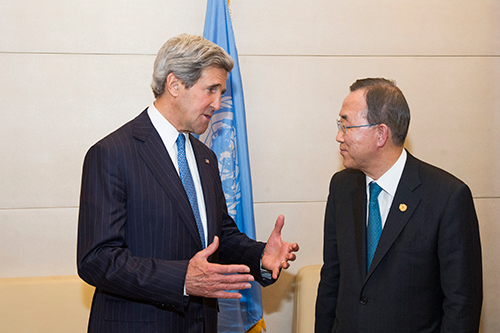
United States Secretary of State John Kerry’s renewed emphasis on foreign policy relating to Sudan and South Sudan is incredibly encouraging. His active engagement on conflicts in the Sudans at the recent African Union, or A.U., summit exemplifies a resumed United States commitment to finding just and equitable resolutions to the many obstacles facing the two countries.
In his opening remarks at the A.U. Summit, Secretary Kerry recalled a prior visit to Juba where he witnessed the historic secession of South Sudan from the North: “The excitement of people to be able to finally vote, that was a remarkable day July 9th when finally a new nation came about. And we dare not forget that it came about not through force but through peaceful and careful negotiation matched by great patience.”
Prior to Kerry’s trip to Addis Ababa, the Congressional Caucus on Sudan and South Sudan sent a letter to the Secretary of State calling for “sustained attention that holistically addresses the core issues driving the conflict.” The caucus specifically requested that the vacant position of Sudan Special Envoy from the United States be filled. While attending the A.U. Summit in Addis Ababa, Sec. Kerry discussed these important issues in meetings with South Sudan’s President Salva Kiir, Sudan’s Foreign Minister Ali Karti and Ethiopian Foreign Minister Tedros Adhanom. His emphasis on the importance of peaceful negotiation and dialogue was evident throughout his visit. Secretary Kerry responded to the Sudan Caucus’ request for a new envoy, a topic that has previously been the subject of extensive advocacy, and voiced his intention to appoint a special envoy to Sudan.
Kerry announced that one of the new envoy's first priorities will be helping resolve the status of the oil-rich Abyei region. Notably, Sec. Kerry encouraged both sides to resolve the final status of the disputed Abyei region by giving its people the chance to vote in a referendum. As John Prendergast, Sasha Lezhnev and Akshaya Kumar argued in Kerry's Moment at the African Summit, “the two Sudans’ continued inability to agree on the final status of the disputed, oil-producing region of Abyei is destabilizing.” Sec. Kerry’s vocal support for a referendum is particularly important in light of the recent violence that resulted in the death of Kuol Deng Kuol, the paramount chief of nine Dinka Ngok chiefdoms who reside in Abyei.
Finally, Sec. Kerry highlighted the situation in two regions in conflict in Sudan: “In South Kordofan and Blue Nile you have people who for a long time have felt that they want their secular governance and their identity respected. They don't want independence. They are not trying to break away from Sudan.” The increased violence in these peripheral states of Sudan has drastically increased civilian deaths and the number of Sudanese refugees in neighboring South Sudan and Ethiopia. Secretary Kerry’s support for the U.S. envoy, increased democracy, continued peaceful negotiations between Juba and Khartoum, and overall increased U.S. attention on the Sudans creates the potential for substantial progress towards ending the atrocities in the region.
Photo: John Kerry and Ban Ki-Moon in Addis Ababa, Ethiopia (UN).

